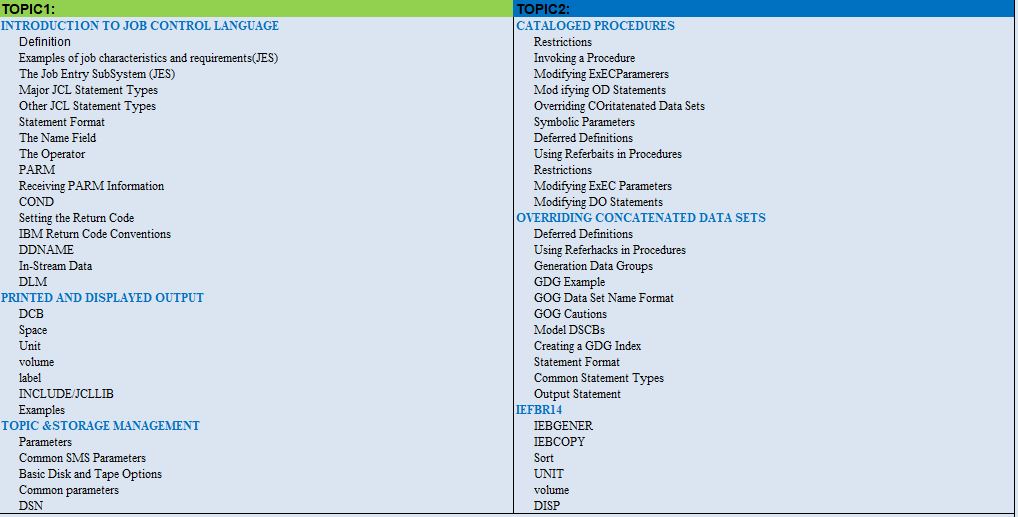
Introduction to JCL training:
JCL training at Idestrainings – JCL means a job control language. Job control language online training a set of control statements that provide mandatory specification to process a job and it is used in mainframe environment which ac t as a communication between the operating system and program then it identifies the resources that a programs expect to use and also programs cannot be executed in mainframe environment without JCL. Every job step is specific in the job manage language throughout a set of Job manage statement. Idestrainings is best in providing Mainframe JCL management online training by real time experts.
Idestraining’s will provide Mainframe JCL management online training provided by our experts and also provide documents for JCL training which are provided by our top professionals.
JCL Online Training Course Content:
- Mode of Training: We provide the Online mode of training and also provide corporate, virtual web training.
- Duration Of Program: 30 Hours (Can Be Customized As Per Requirement).
- Materials: Yes, we are providing materials for Mainframe JCL management online training
- Course Fee: Please Register in Website, So that one of our Agent will assist You.
- Trainer Experience: 15+ years.
MAINFRAME JCL MANAGEMENT ONLINE TRAINING COURSE CONTENT

Overview of JCL training:
In job processing stages job enters the JES then JCL interpretation in JES then Job queuing then job execution and log creation in spool it uses the input data and then it generates the output data in the form of data set or printer or it can be in spool as well. Idestrainings is good in providing JCL training with live projects by real time experts.
JCL training submission and conversion:
Here JCL has submitted to JES then initiator selects a job for execution and initiator attaches the interpreter to build control blocks. JCL training is transformed into an interpret copy to be understood by JES moreover stored inside to a data set which we call as a spool.
Job queuing:
JES decides the priority of the job based on Class and priority which we mention which we mention inside the job statement then it checks for JCL errors and then it schedules the job in the job queue so that based on the priority it is decided whether and when to execute the job. We are best in providing JCL training by experts from India at flexible timings.
Job execution:
The job is executed once it reaches the uppermost priority and directs the productivity towards the target as particular in the JCL, It can be data set or in a spool.
Job purging:
Here the allocated resources and spool space is released and it issues a message to the operator that job have been purged from the system.
JCL training statements:
JCL statements are coded in 80-byte records that mean when we create a PDS we define the record length as 80 characters and the columns 1-72 can be used to code JCL and from the columns 73-80 are reserved for an optional sequence number. Here the syntax is [identifier][name][operation][parameters][comments].
Identifier:
Identifier tests the system that this is a job statement, starting from column1 it can JCLor job statement or ready statement or exit statement.
Name:
Here the job statement name starts from the 3rd column and also starts with the character and it can be a maximum of 8 characters long.
Operation:
The operation can be Job, exit or it can be DD. Here job statement is one operation like we can mention the programmer name or class or priority or exit and also procedure name and the DD statements is used to pass input data side information or output data side information and it should be preceded and followed by a space.
Parameters:
- For each job statement, we have different parameters. Parameters are used to pass certain values and parameters start one column after operation field and then defined parameters for each operation and they are separated by commas. Here there are two types of parameters they are positional parameters and keyword parameters.
- Positional parameters are based on some positions and here we can change the position and for supposed to omit any positional parameters code an extra comma. Keyword parameters are coded with a keyword followed by an equal sign and a value and there is no particular order for them.
Comments:
After coding parameters we need to give space then the only system will understand the comment section is started so this is preceded by one space after parameters and comments are just for reference. We can write anything and it can never be executed.
IBM Mainframe JCL training:
- Mainframe JCL management online training which is very important when we are working on the IBM mainframe operating system. Mainframe JCL management is generally a scripting language that is used on the mainframe operating system to instruct the system on how to run a batch jobs. In order to compile COBOL program, there should be an intermediate or an interpreter so with the help of the scripting language or JCL we would be compiling our COBOL programs and executing those programs. our COBOL training helps you to learn all the concepts of cobol easily and effectively.
- Compiling and executing compiling is one job and executing and getting the result is another job. In IBM Mainframe training JCL management terminology we know in terms of jobs. The important usage of JCL is it can compile both batch and online programs. It is also used for integrating the programs and it also passes a large volume of data from one program to another program.
- Here JCL training can create or delete data sets and can also organize data in an ascending or descending order and it can also be used to copy the records from one dataset to another dataset. It can filter the records, change layout report, send the report to the printer and here we can also transfer data from one system to another system for example from mainframe system to the UNIX system.
- Any batch procedure consists of major task every major task is separated into subordinate tasks and the subordinate task is separated into DD that is data sets. Here in Job control language online training Job is identified by job name and EXEC is identified by activity name and DD is identified by DD name. Job name, activity name and DD name are user-defined names and job, EXEC and DD are system-defined keywords.
- In JCL, IBM mainframe training is used where we can take that main task is Job and subtask is EXEC and data set is DD. Idestrainings will provide more details of IBM mainframe training during the classes covered in JCL training.
Mainframe datasets:
Data is stored in data sets we have two types of data sets one is one is PS that is physical sequential and the other is PDS that is partitioned data set. PS is similar to a flat file in windows and data can be accessed in sequential order only. PDS is a group of data sets and also it is similar to a folder in windows in which we can have multiple files in it. Our trainers will provide in depth knowledge about Mainframe JCL training by industry experts.
JCL libraries:
- Here we have jobs at JOBLIB, STEPLIB, JCLLIB, include statement. Job level is used for tracing the address of the program that actually needs to be executed in a JCL. STEPLIB is used for recognizing the address of the program to be executed among in a job step and it is specific after the EXEC statement and before the DD statement of the Job step.
- JCLLIB is for procedures it should be coded after job statement and specifies the PDS where the procedure is present. Suppose we have a module and we need to write it every time like we have some statements that need to be written in every program or all the JCLs and we have to write them again and again in the JCL.
- so that in JCL we have the option that is what we can do is suppose we have job card in that all the statements are almost same so if we want to use that parameter we can use include statements and set of JCL statements coded within a member of a PDS that can be included to a JCL using an include statement. When the JES interpret the set of JCL statement inside the include member to replace the include statement.
Conclusion for JCL training:
JCL is used for giving a code for execution in batch mode. The job control language pay scale can be up to 5, 77,145Rs per annum. In JCL there are some of the IBM utilities like IEFBR14, IEBGENER, IEBCOPY, and IEBCOMPR. Enroll for the JCL training so that we have the best trainers to guide you. The classes will be provided during the weekdays or weekends based on the students demand and we also offer many other courses based on industry needs.


